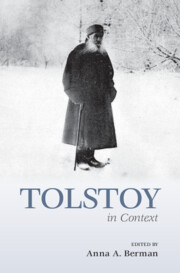Book contents
- Tolstoy in Context
- Tolstoy in Context
- Copyright page
- Contents
- Figures
- Notes on Contributors
- Preface
- Acknowledgments
- Note on Citations, Translations, and Transliterations
- Chronology
- Part I The Man
- Part II Russian Social and Political Contexts
- Part III Literature, the Arts, and Intellectual Life
- Chapter 16 Tolstoy’s Oeuvre
- Chapter 17 Peasant Schools and Education
- Chapter 18 Russian Philosophy
- Chapter 19 The Russian Literary Scene
- Chapter 20 European Literature
- Chapter 21 European Philosophy
- Chapter 22 Theater
- Chapter 23 Music
- Chapter 24 The Visual Arts
- Part IV Science and Technology
- Part V Beyond Russia
- Part VI Tolstoy’s Afterlife
- Suggested Further Reading
- Index
Chapter 19 - The Russian Literary Scene
from Part III - Literature, the Arts, and Intellectual Life
Published online by Cambridge University Press: 05 January 2023
- Tolstoy in Context
- Tolstoy in Context
- Copyright page
- Contents
- Figures
- Notes on Contributors
- Preface
- Acknowledgments
- Note on Citations, Translations, and Transliterations
- Chronology
- Part I The Man
- Part II Russian Social and Political Contexts
- Part III Literature, the Arts, and Intellectual Life
- Chapter 16 Tolstoy’s Oeuvre
- Chapter 17 Peasant Schools and Education
- Chapter 18 Russian Philosophy
- Chapter 19 The Russian Literary Scene
- Chapter 20 European Literature
- Chapter 21 European Philosophy
- Chapter 22 Theater
- Chapter 23 Music
- Chapter 24 The Visual Arts
- Part IV Science and Technology
- Part V Beyond Russia
- Part VI Tolstoy’s Afterlife
- Suggested Further Reading
- Index
Summary
The literary context of Tolstoy matters because his works not only emerged in concrete literary and historical circumstances, but expressed in their own ways shared concerns, ideas, fears, and aspirations, characteristic of the respective periods and, in particular, of the generation affected by the humiliating outcome of the Crimean War, the collapse of the decades-long isolationist conservative “scenario of power” of Nicholas I, and a series of forthcoming profound social and political reforms that changed the emotional and ideological outlook of Russian culture. The chapter primarily focuses on Tolstoy’s epic novel War and Peace within its actual literary and ideological contexts, including fierce contemporary debates on the most pressing issues of the 1860s, unleashed in powerful, tendentious “thick” journals. To paraphrase Tolstoy’s final sentence of the novel, the epistemological value of seeing Tolstoy in conversation with his contemporaries (Turgenev, Chernyshevsky, Dostoevsky, Leskov, Saltykov-Shchedrin, Grigoriev, Dmitry Pisarev, Surikov, Musorgsky, etc.) lies both in the renunciation of vision of his “unreal immobility in space” (generally taken for granted) and concurrently in the recognition of his dependence on other writers and literary contexts “of which we are unaware.” Gulliver is determined by his bonds.
Keywords
- Type
- Chapter
- Information
- Tolstoy in Context , pp. 153 - 162Publisher: Cambridge University PressPrint publication year: 2022

